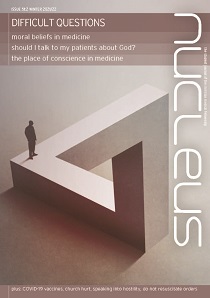'During a recent GP placement, my GP tutor took me on a home visit to see a patient for a 'routine elderly review'. One of the priorities of the visit seemed to be discussion of end-of-life scenarios, and completion of a 'Do Not Resuscitate' form. The patient was very worried about being made 'not for resus', saying she was a Christian who believes only God can take life. She asked if the NHS was saving money by killing people off. The doctor signed the DNAR form on clinical grounds of 'futility', as the patient is elderly and housebound with heart failure and COPD. I'm confused by the whole situation. Help please!?
This is a question that comes up regularly in our local student CMF group. It's a common and confusing scenario, with potentially multiple different factors at play.
DNAR, or DNACPR forms, are a way of communicating across teams the clinical decision not to attempt cardiopulmonary resuscitation in the event of cardiac arrest.
Discussions around end of life and CPR, done well, are in fact an appropriate part of good medical practice. [1] In general practice and routine community care, there is a drive to open the conversation early, exploring what is important to the individual patient. This can be preferable to rushed emergency discussions in contexts such as the ED or an acute medical ward.
As Christian medics, however, aware of a possible agenda in some parts of society to legalise the killing of patients and also acutely aware of limited resources in the NHS, we can readily appreciate the concerns of some patients.
For the scenario described above, here are some principles to think about:
First of all, these decisions are not to do with actively killing patients, or euthanasia. Withholding resuscitation allows nature to take its course when illness or frailty will lead to death. It is likely that even with attempted resuscitation, the same outcome would ensue, especially in the patient described above, who is likely to die within the coming months or year from her underlying heart and lung conditions. The decision being made is that attempting cardiopulmonary resuscitation (CPR) would be inappropriate; it would be unlikely to succeed.
One very helpful resource to explore these issues further is the booklet produced by CMF, Facing Serious Illness, [2] which is helpful for medics and churches alike.
As Christians, we value life very highly. We are rightly offended when we hear individuals being written off by our colleagues or said to have 'no quality of life'. Who are we to judge the value of another's life? What we can often find ways to do, however, is share joy and hope.
Home visits are a precious opportunity to share a cup of tea, comment on family photos, spend a few moments sitting together. Warm smiles, gentle words, a phone call on loudspeaker to update a family member - these can all bring joy and reassurance, and a level of trust in the relationship. The Lord cares deeply for the lonely, the frail, the elderly, and the widow. He calls us to take the extra time, to communicate clearly, to listen properly, and to show respect.
The challenge is to be different to our cynical, world-weary colleagues, to be 'blameless and pure, children of God', shining as lights in the world. [3]
If you have a burning question, email us at:[email protected]. The best question each issue wins free student membership for a year.
































